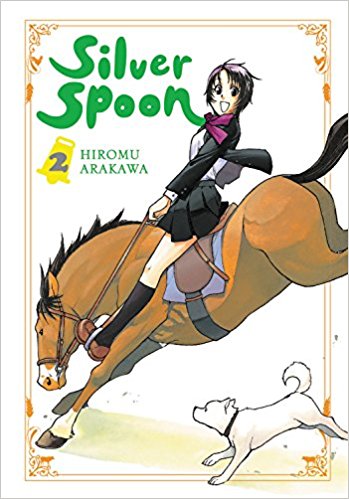By Hiromu Arakawa. Released in Japan as “Gin no Saji” by Shogakukan, serialization ongoing in the magazine Weekly Shonen Sunday. Released in North America by Yen Press. Translated by Amanda Haley.
It seems a bit startling for our hero and his classmates to be headed into summer break right at the start of the series, but that’s the Japanese education schedule for you, which begins in April. And summer break at an agricultural school means everyone goes back to their farms… except Hachiken, who has no farm but does have an intense desire not to go back home. So he takes up Mikage’s offer to go to her farm for the holiday. You’d think cute romance would ensue, but that’s pretty much still just in Hachiken’s head right now. Instead we get more examples of Hachiken as a fish out of water, and a lot of discussion of the various aspects of farm life, including butchering deer and watching a cow give birth. But before that, there are more important things to do. Things like pizza. Priorities, please.
One of the many things I love about Silver Spoon is the way that Arakawa portrays Hachiken, the male lead. It would be all too easy to turn him into your standard harem drip, a la Keitaro Urashima. But while Hachiken is inexperienced in the ways of farming life, and still having difficulty with the idea of “animals become food”, he’s smart as a whip and quick to understand things. Moreover, he’s a planner who sees ahead, which will become very important as the series goes on. For now it’s important because it allows him to see everything that needs to be done with the pizza oven, which ends up requiring the help of most of the school in order to repair it and procure ingredients to make the pizza. He’s also getting a little more buff, which is inevitable when you’re doing the daily farm routine he has to do. But most importantly, he feels realistic. He feels like an actual person. This is what Arakawa has always excelled at, and it goes doubly for this series.
I also love the attention to detail we see here. There’s discussion of what kinds of pizza cheese work best in Japan (gouda, not mozzarella), and we see three kinds of farms: Komaba’s small one where even the elementary school twins are pitching in constantly, Mikage’s medium-sized one (which she is expected to take over, something she clearly doesn’t want to do but is unwilling to open up about just yet), and Tamako’s huge industrial farm showing off the finest in modern advancements. When we kept joking that Silver Spoon was a farming manga back in the pre-licensed days, we weren’t kidding. This book is here to tell you what farming is really like, and that it requires a lot of labor, time, money, and care. No matter how big or how small your farm is, things need to be done constantly.
Aside from Mikage’s worries about her future and Hachiken avoiding his parents, there’s not really a lot of forward progress on a “plot” here per se. But the plot is a coming of age story, and in that sense we see Hachiken grow and change a lot in this volume. If you like Arakawa’s books, farms, or just good manga, Silver Spoon is essential.

